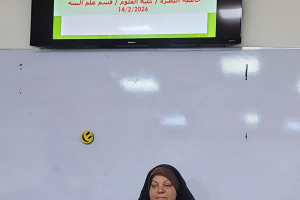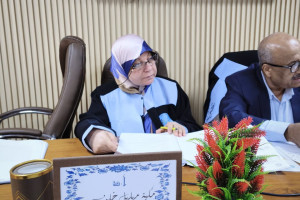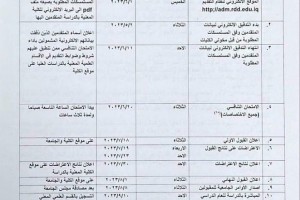
The College of Science at the University of Basrah organized a seminar entitled (Comparison between bacteriuria from UTI of diabetes and healthy human against some biological factors) by the graduate student Zainab Sadeq Baqer , The seminar aimed to compare bacterial isolates from diabetic and non-diabetic individuals suffering from urinary tract infections (UTIs). The study focused on identifying the types of bacteria in both groups, analyzing their resistance to antibiotics, evaluating their ability to ferment different sugars, and detecting the presence of the Sea gene, which is known to be associated with toxin production and hematuria. The research utilized advanced molecular techniques, including 16S rRNA gene sequencing, phylogenetic tree construction, and RAPD-PCR, to provide accurate identification and comparison of the bacterial strains. These results were also evaluated alongside those obtained from the VITEK identification system, revealing notable discrepancies between biochemical and genetic methods. The study concluded that Escherichia coli was the most frequently isolated bacterium among both groups, though some bacterial species were exclusive to diabetic or non-diabetic individuals. Differences in sugar fermentation patterns and antibiotic susceptibility were also observed. Based on the findings, the researcher recommended increasing the reliance on genetic-based bacterial identification in critical UTI cases especially among diabetic patients, where rapid and accurate diagnosis is essential. Controlling blood sugar levels is also emphasized as high glucose concentrations may encourage bacterial growth and mutation. The study further suggested that routine laboratory testing for bacterial toxins, particularly the Sea gene, could help explain severe UTI symptoms like hematuria and guide more effective treatment options.







